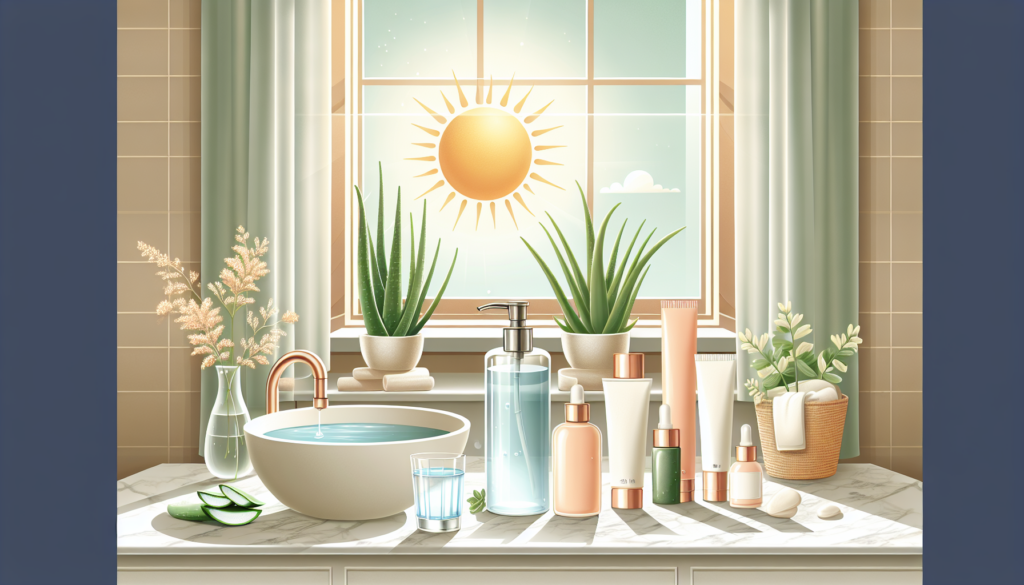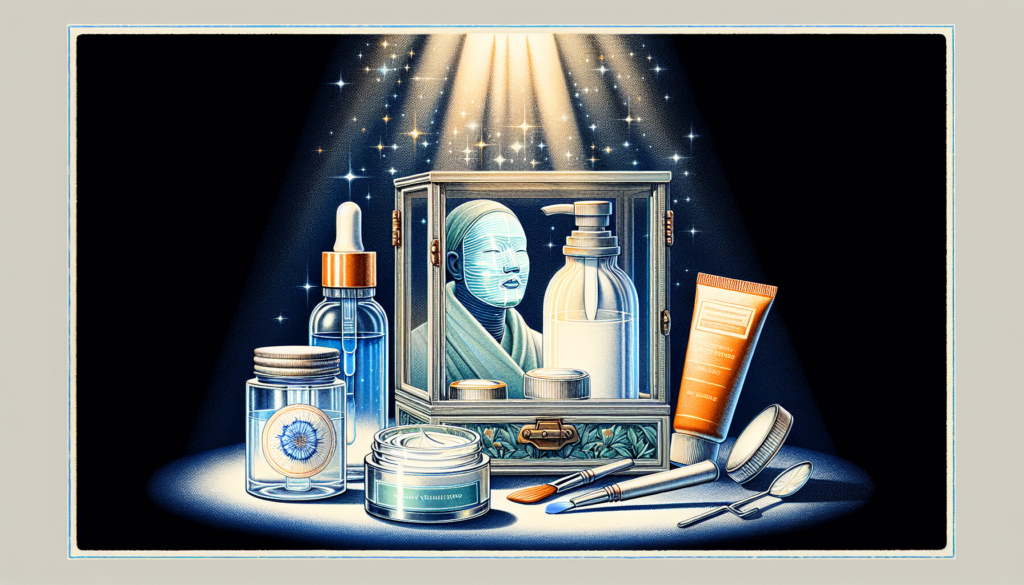After you’ve pampered yourself with a relaxing skin treatment session, it’s important to know how to properly care for your skin afterward. Whether you’ve indulged in a rejuvenating facial, a refreshing chemical peel, or a soothing laser treatment, the aftercare steps will ensure your skin stays healthy and radiant. In this article, we’ll explore the essential aftercare routine to maintain the benefits of your skin treatment session. From gentle cleansing and moisturizing to protecting your skin from sun exposure, we’ve got you covered with all the tips and tricks to keep your skin looking its best. So sit back, relax, and let’s dive into the world of aftercare for a glowing complexion.

Cleansing and Moisturizing
Choosing the right cleanser
When it comes to choosing a cleanser for your skin, it’s important to consider your skin type and any specific concerns you may have. Look for a gentle cleanser that is suitable for your skin type, whether it’s oily, dry, or sensitive. Avoid cleansers that contain harsh ingredients, as they can strip the skin of its natural oils and cause dryness or irritation. You may also want to consider using a cleanser with ingredients like salicylic acid or benzoyl peroxide if you have acne-prone skin.
Proper cleansing technique
Proper cleansing technique is essential to ensure that your skin is thoroughly cleansed without causing damage. Start by wetting your face with lukewarm water, as hot water can be drying. Apply a small amount of cleanser to your fingertips and gently massage it onto your skin in circular motions for about 30 seconds. Rinse off the cleanser with water and pat your face dry with a clean towel. Avoid rubbing your skin vigorously, as this can cause irritation.
Benefits of moisturizing
Moisturizing is an important step in any skincare routine, as it helps to keep your skin hydrated and nourished. After cleansing, apply a moisturizer that is suitable for your skin type. If you have oily skin, look for a lightweight, oil-free moisturizer. For dry skin, opt for a richer, more emollient moisturizer. Moisturizing regularly can help to improve the texture and appearance of your skin, and can also help to prevent dryness, flakiness, and irritation.
Protecting Your Skin
Sun protection
Protecting your skin from the sun’s harmful rays is crucial in maintaining healthy and youthful-looking skin. Make sure to apply a broad-spectrum sunscreen with an SPF of 30 or higher every day, even on cloudy days. Reapply sunscreen every two hours, or more often if you’re sweating or swimming. In addition to sunscreen, wearing protective clothing, such as hats and sunglasses, and seeking shade during peak sun hours can further protect your skin from sun damage.
Avoiding harsh chemicals
Avoiding harsh chemicals in your skincare products can help to prevent irritation and sensitivity. Read the ingredient labels carefully and choose products that are free of sulfates, parabens, fragrances, and other potential irritants. Opt for gentler, more natural products that are formulated with nourishing and soothing ingredients.
Choosing the right products
Choosing the right skincare products for your skin type and concerns is essential in maintaining a healthy complexion. Consult with a skincare professional or esthetician to determine your skin type and any specific concerns you may have, such as acne, aging, or hyperpigmentation. They can recommend products that will address these concerns and help you achieve your skincare goals.
Managing Discomfort
Reducing redness and inflammation
If you experience redness or inflammation after a skin treatment session, there are several ways to help reduce these symptoms. Applying a cold compress or ice pack to the affected area can help to constrict blood vessels and reduce redness. You can also try using a gentle, soothing skincare product that contains ingredients like aloe vera or chamomile, which have anti-inflammatory properties.
Soothing the skin
In addition to reducing redness and inflammation, it’s important to soothe and hydrate the skin after a skin treatment session. Opt for skincare products that are gentle and calming, such as aloe vera gel or a hydrating serum. Avoid using harsh or abrasive products that can further irritate the skin. Keep the skin hydrated by drinking plenty of water and moisturizing regularly.

Avoiding Certain Activities
Avoiding excessive sweating
After a skin treatment session, it’s important to avoid excessive sweating, as sweat can irritate the skin and cause breakouts or infections. Avoid strenuous exercise or activities that may cause you to sweat heavily for at least 24-48 hours after your treatment. Instead, opt for light exercise or activities that won’t cause excessive sweating.
Avoiding hot showers or baths
Hot showers or baths can strip the skin of its natural oils and cause dryness or irritation, especially after a skin treatment session. Instead, opt for lukewarm water and keep your showers or baths short. Avoid using harsh soaps or cleansers that can further dry out or irritate the skin.
Avoiding makeup application
To allow your skin to heal properly after a skin treatment session, it’s best to avoid applying makeup for at least 24 hours or as recommended by your esthetician. Makeup can clog the pores and prevent the skin from breathing, which may interfere with the healing process. If you need to wear makeup, opt for non-comedogenic and mineral-based products that won’t clog the pores.
Maintaining a Healthy Lifestyle
Diet and hydration
Maintaining a healthy diet and staying hydrated can have a significant impact on the health and appearance of your skin. Eat a balanced diet that includes plenty of fruits, vegetables, lean proteins, and healthy fats. Avoid or limit your intake of processed foods, sugary snacks, and excessive caffeine or alcohol, as they can contribute to skin issues. Drink plenty of water throughout the day to keep your skin hydrated and flush out toxins.
Exercise
Regular exercise not only benefits your overall health but can also improve the condition of your skin. Exercise increases blood flow to the skin, which promotes a healthy complexion and helps to flush out toxins. Aim for at least 30 minutes of moderate-intensity exercise, such as brisk walking, jogging, or cycling, at least five days a week.
Reducing stress
Stress can have a negative impact on your skin, leading to breakouts, dryness, or dullness. Find ways to manage and reduce stress in your life, such as practicing relaxation techniques, engaging in hobbies you enjoy, or seeking support from friends and family. Incorporate self-care activities into your routine, such as taking baths, practicing yoga or meditation, or enjoying a soothing skincare routine.
Follow-up Appointments and Recommendations
Scheduling follow-up appointments
After a skin treatment session, it’s important to follow up with your esthetician as recommended. They may recommend a series of treatments or a specific timeframe for follow-up appointments to achieve optimal results. Scheduling regular follow-up appointments allows your esthetician to assess the progress of your treatment and make any necessary adjustments or recommendations.
Additional treatments and products
Your esthetician may recommend additional treatments or products to complement your skin treatment session and enhance your results. These recommendations may include facial masks, serums, or specialized treatments that target specific skin concerns. Follow their advice and incorporate these treatments or products into your skincare routine as instructed.
Choosing a skincare routine
Your esthetician can help you choose a personalized skincare routine that is tailored to your skin type and concerns. They can recommend specific cleansers, toners, moisturizers, and treatments that will address your unique needs. Following a consistent skincare routine recommended by a professional can help to maintain the results of your skin treatment session and promote healthy, radiant skin.
Possible Side Effects and How to Minimize Them
Understanding common side effects
Some common side effects that you may experience after a skin treatment session include redness, tenderness, mild swelling, or temporary dryness. These side effects are usually temporary and should resolve on their own within a few days to a week. However, if you experience severe or persistent side effects, it’s important to contact your esthetician for further guidance.
Minimizing side effects
To minimize side effects after a skin treatment session, follow all aftercare instructions provided by your esthetician. This may include applying any recommended skincare products, avoiding sun exposure, and refraining from certain activities. Keep your skin hydrated by using a gentle, moisturizing product and drink plenty of water. Avoid touching or picking at your skin, as this can worsen side effects and delay the healing process.
Specific Aftercare for Different Skin Treatments
Aftercare for chemical peels
After a chemical peel, it’s important to protect your skin from the sun and avoid any harsh or abrasive skincare products. Follow your esthetician’s instructions for cleansing and moisturizing your skin, and avoid picking or scratching at any peeling or flaking skin. Use a gentle exfoliating product, if recommended, to aid in the shedding process.
Aftercare for microdermabrasion
After microdermabrasion, it’s essential to moisturize your skin and protect it from the sun. Avoid using any harsh or abrasive skincare products, as this can further irritate the skin. Keep the skin hydrated by applying a gentle moisturizer regularly and avoid touching or picking at your skin.
Aftercare for laser treatments
After laser treatments, it’s crucial to protect your skin from the sun and avoid any harsh or abrasive skincare products. Follow your esthetician’s instructions for cleansing and moisturizing your skin, and avoid picking or scratching at any dry or flaking skin. Apply a broad-spectrum sunscreen with an SPF of 30 or higher every day to protect your skin from UV damage.
Importance of Communication with Your Esthetician
Discussing any concerns or questions
Open and honest communication with your esthetician is essential in ensuring that you receive the best possible skincare treatment and aftercare. If you have any concerns or questions before or after your treatment session, don’t hesitate to reach out to your esthetician. They can provide guidance, answer your questions, and address any issues or concerns you may have.
Seeking advice on post-treatment care
Your esthetician is an expert in skincare and can provide valuable advice on post-treatment care. They can recommend specific products, offer tips on managing side effects, and provide guidance on maintaining the results of your treatment. Don’t hesitate to seek their advice and follow their recommendations for the best possible outcome.
Providing feedback on the treatment
Providing feedback to your esthetician after a skin treatment session is valuable in helping them assess the effectiveness of the treatment and make any necessary adjustments. If you are satisfied with the results, let them know. If you have any feedback or suggestions for improvement, share them in a constructive and respectful manner. Your feedback can help them enhance their services and provide better care for future clients.
Conclusion
Proper aftercare following a skin treatment session is crucial in maximizing the benefits of the treatment and maintaining healthy, glowing skin. By following the recommended aftercare practices, such as choosing the right cleanser and moisturizer, protecting your skin from the sun, and avoiding certain activities, you can ensure that your skin recovers effectively and achieves optimal results. Remember to communicate openly with your esthetician, seek their advice, and follow a consistent skincare routine to keep your skin looking its best. With the right aftercare, you can enjoy the long-lasting benefits of your skin treatment and continue to feel confident in your own skin.

